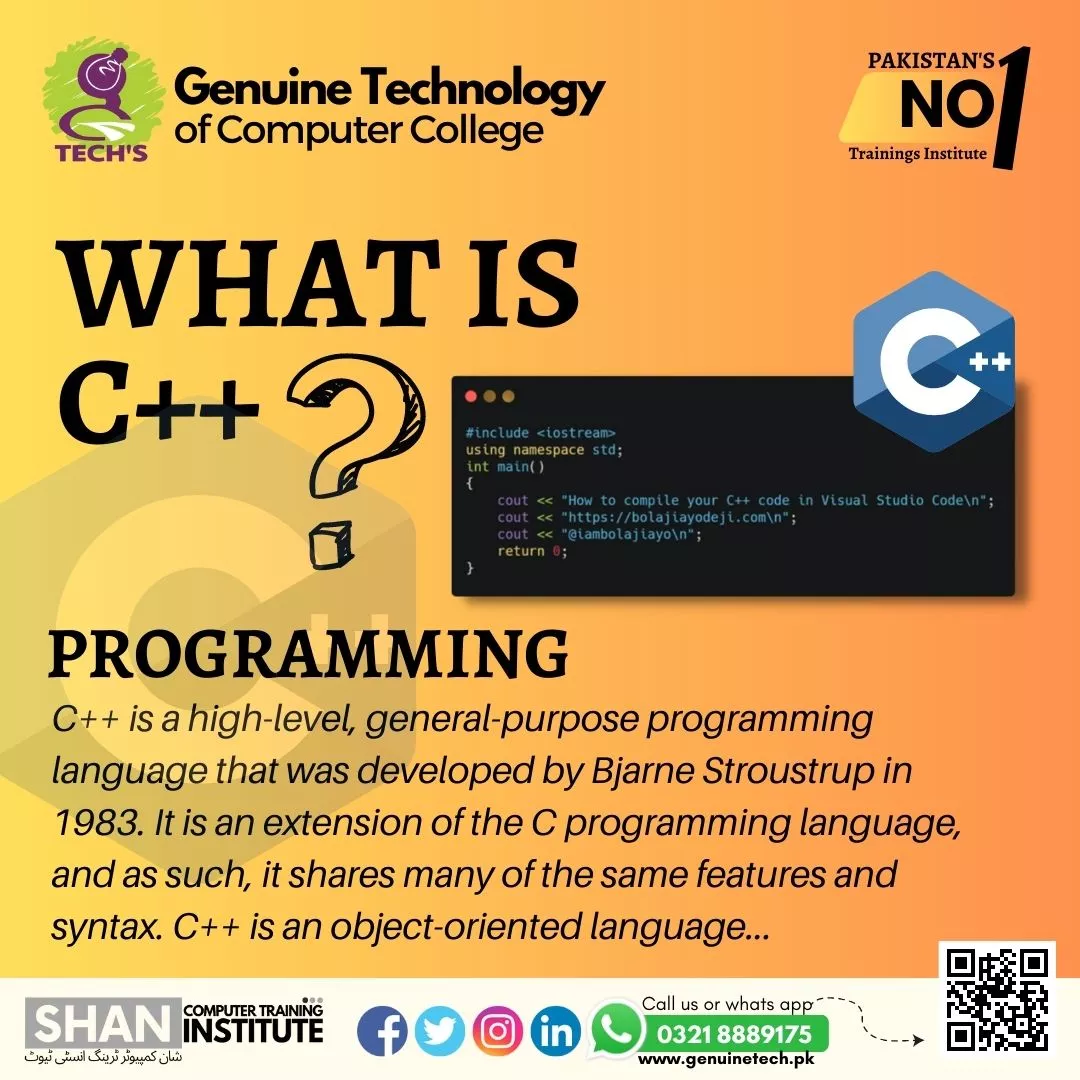The College > Blog > Programming Fundamentals Course in Lahore
Programming Fundamentals Course in Lahore
What is the difference between programming and coding
Genuine Tech will introduce you to a programming fundamentals course for the students and the candidates who is interested in coding in this computer course you may learn about what are the FUNdamentals of programming codes and the 4 basis of coding. In this computer course you may find out your hidden abilities by dealing with the real life projects and tasks.
You may learn about the problem-solving process and the seven steps which you can use to solve any programming problem in computer programming the basic concepts include variables, basic control structures, data structures, object-oriented programming, troubleshooting. Genuine Tech (GT) after the success in the computer courses like web development, digital marketing course and the seo courses may introduce you this Programming fundamentals course and in this course we are providing you the skills necessary for the effective of application of computer and computer programming.You may learn the basics of programming and you can use these basics concept across many similar languages these golden rule or concepts in this course is helpful for you to start your career in any programming languages. The main course module which may cover in our programming fundamentals are;
- Introduction to Programming
- Variable declaration
- Basic syntax
- Data type and structures
- Functional programming
- Programming logic
- Selection Statements
- Looping Statements
- Function and Array
- object-oriented programming
- Debugging
- Files
- Objects
- IDEs and coding environments
Fundamental concepts of programming or coding
In this computer course of programming fundamentals we may includes the basic fundamental concepts of coding which is variable declaration, basic control structures, data structures, object-oriented programming, trouble shooting and debugging and many programming tools. These concepts for basics of coding may help you to start your career in any programming languages like C, C++ and Python.
Here we discussed the 5 Fundamnetals Every Programmer Should Know or every candidate or a beginner must know that;
Variable Declaration and their Characteristics
In programming fundamentals language you can say variables are the box or a containers which is used for storing data values and it is the memory location for a data type. You can create a Variable by giving them a specific name and type like int, boolean, float and many more that are usually in alphanumeric which is containing a-z and 0-9 and often in programming languages you can use underscore and the dollar sign special characters as well in order to declare variables and end the line with a semicolon(;). These are the some variable types that is used in programming languages;
Local and Member Variables
In this computer pogramming course you can learn the difference between local and member varaibles and their working you can use a local variable to store data and you can declared them by giving a alphanumeric name to them whereas the member varaibles are those variables in programming languages which you can use inside a class or a structure or in module but cannot be used in their internal programs and procedure.
Shared and Instance Variables
These varaibles can be declared by using a Shared keyword or it may exists within the class or a structure in a single copy shared. On the other hand Instance variables are those variables which is used only in class but outside the class method.
Global Variable
In programming languages this type of variable can be declared outside a function which you can acessible throughout the program.
Basic Syntax in programming
In programming fundamentals language you can use their basic syntax for coding and for this purpose in our computer course we include the fundamental syntax of the language that you learn it is very important and you can say the golden rule for coding because without the syntax it it impossible to read and understand a programming language whether you are working in web development or in software development.
Control structures
In the computer programming flow control strucutres are the fundamenal components used to instruct or give commands to the programs to take specific actions on specific part of the computer program. These are the 3 types of control structure;
- Sequential control structure: It refers to the line-by-line or step by step execution of the statement which is usd in the program.
- Selection control structure: It refers to the selection between two or more alternative paths.
- Iteration control structure: It refers to the grouping of code which is designed to repeat a set of related statements.
Data types and Data structures
In our programming expert computer course you may learn about the classification of data using data types and you learn the collection of data values in data structure both of these are important in computer programming fundamentals course. Here is the common useful datatypes which is used in computer programming;
- String: A sequence or a set of characters enclosed between the double quotes" ".
- Boolean: A logical data type used to represent the concepts of true and false.
- Integer:It basically represents whole numbers.
- Characters: It may represent the strings of ASCII characters.
- Arrays: That represents a collection of elements (values or variables).
In Data Structures you are dealing with many operations which is applied on the data which is in the collection form it is useful for managing and sorting data fastly and efficiently here is the useful types of data structures which is used in computer programming fundamentals;
- Stacks
- Queues
- Heaps
- Trees
- Linked lists
- Arrays
- Tables
- Graphs
Functional Programming
In functional programming you may learn about the different functions and their working like virtual function, pure virtual function, function overloading and function overriding these are the major part in the programming concepts which may covered in the programming course.
With the help of functional programming fundamentals you may create building software and many other functionality in the software development and in website development.
Object-oriented programming
It is the most important concept or you can say the phase in the computer programming in which you may learn about the 4 principles of OOP which is very important in order to create a software application or a web application basically in obect-oriented programming all the things is working on behalf of classes, objects and methods. Now we discuss what are the 4 basics of OOP in computer programming fundamentals this is most important in order to understand and mastering the object-oriented programming here is;
- Inheritance
- Polymorphism
- Abstraction
- Encapsulation
With these basics of OOP you have many benefits like it may increase the modularity of the application, Reusability, Productivity, Security and Flexibility of the software application. It can be using in manufcaturing and designing of applications.

Debugging
In debugging you may learn how to remove an error in the computer programs basically a software developer is creating or you can say developing a computer software through debugging they can check each and every aspect of the programs that is working fine or not.
Here is the 4 steps of debugging which you must know in computer programming;
- Comprehend the system
- Test the system
- Locate the error
- Fix the error
Here in this programming course we also mention the list of programming errors in a software development or an application development the first one is the Syntax error which is occuring in the execution time of the program this is occuring because you may include extra commas in the program or may be due to missing the brackets and can be solved by proper apply the syntax of a programming language.
The next one is the Logical errors which is occuring because of the lack of the coding logic and the algorithmn is not properly which in result may give you the wrong output of the program you can solve this logical error by proper logic building algorithm methods and by initializing the variables properly in the program.
The third or the last one error is the Latent errors you can say this is the hidden errors in which you may create the program which may accept the users date of date, name and number only but you may pass a different value in these inputs so in result at the execution time your program is not working properly it is crashed during the execution you can solve this type of error by providing the same values as mention in the data types.
Programming tools used for coding
There is many sotware tools which is used in programming fundamentals like assemblers, compilers and linkers here we can discussed the best tools to help make programming easier;
- Visual Studio Code
- Dev C++
- Vim
- Sublime Text
C++ Programming Language
In the world of programming languges C++ is a powerful general purpose programming language which is used in developing software application as well as operating sysems, games and the browser along with that it may supports diferent methods and ways of programming which may include object-oriented programming, procedural programming and many more.
When you enroll in the Computer Science Engineering Subjects most of the universities is started their programming lectures with the C++ programming in which they clear about the basic concept of C++ programming, syntax in C++ programming and so on here is the top universities in Pakistan for programming fundamentals categorized as;
- University of the Punjab
- Information Technology University (ITU)
- COMSATS University Islamabad (CUI)
- FAST National University
- NCBA&E
Star Patterns in C++ Programming Fundamentals
In most of the programming languages star patterns is the most important topic and it is useful to boost up the logical and critical knowledge of the programmers. In this article we will discuss the following top star patterns program in C++;
- Square pattern
- Hollow Square pattern
- Left triangle star pattern
- Right triangle star pattern
- Left Down Triangle pattern
- Right Down Triangle pattern
- Hollow triangle star pattern
- Pyramid star pattern
- Reverse pyramid star pattern
- Hollow pyramid pattern
- Diamond star pattern
- Hollow diamond star pattern
- Hourglass star pattern
- pascal star pattern
- Heart pattern
- Plus star pattern
- Cross pattern program
What is array in C++?
In programming language C++ arrays are used to store multiple valus ina single variable rather than you create a separate varaible for each value.
What is the file handling in C++?
In C++ file handling is the concept or a mechanism to store the output of a program in a file and then you perform many operations on it.
How can I learn fundamental programming?
Genuine Tech may provide the roadmap to learn programming basics step by step first you need to learn web programming and development, web design essentials like HTML, CSS & JavaScript and do practices by creating projects after that you may learn object-oriented programming in C++, learn the 4 pillars of OOP which is used in C++ programming this is the best programming fundamentals for non programmers each candidate who is interested in web coding can enroll in this programming fundamentals crash course and enhance their programming skills.

Which institute is best for programming in Lahore?
Genuine Technology of Computer College (GT) is the best programming expert institute in Lahore here you can learn programming from scratch and upon the completion of course you become a programming expert ready to start their career as a professional programmmer in any tech industry you may choose web development, mobile app development, Operating system development field as a programmer and earn a lot of money online.
Tips to improve programming fundamentals skills
Genuine Tech is providing you the best tips to improve programming skills by giving you the real life projects, assignments and tasks in the guidance of programming experts in Genuine Tech (GT) a candidate can improve their skills, find out their hidden abilities and the working potential and start their careers in pogramming and earn a six figure salary. You need to take part in coding competitions in our College cpp programming and along with that you work on mini-projects to improve programming skills.
You can explore divimode.com to get further information about programming fundamentals.






